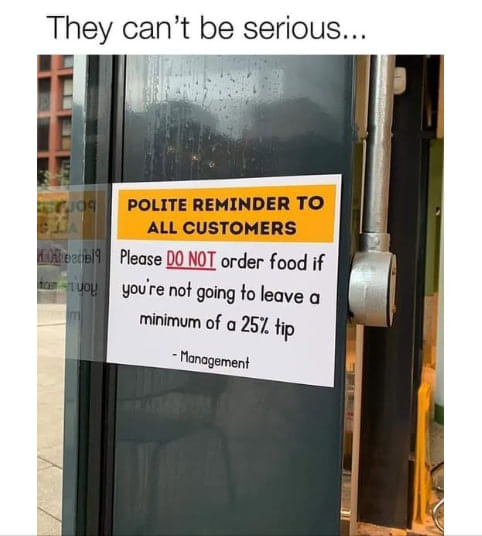Man Stirs Controversy by Refusing to Leave a 25% Tip
Tipping has long been a hot-button issue, but recent debates suggest it’s more divisive than ever.
With rising costs, evolving expectations, and ongoing discussions about fair wages, many people are questioning whether tipping remains a necessity—or if it’s simply getting out of hand.
While some argue that tipping is essential to ensuring fair wages for workers, others believe it has become an outdated and increasingly burdensome practice.

Dustin Anderson recently took a bold stance against what he sees as an overwhelming tipping culture, sparking intense debate among his followers. His comments ignited discussions about whether tipping has strayed from its original purpose and if the system itself needs to be reevaluated.
In recent years, tipping culture has become a hotly contested issue, particularly in the U.S. and parts of Europe. What started as a simple way to reward exceptional service has transformed into a complex and, for some, confusing expectation—leading many to question its fairness.
As tipping norms continue to evolve, the growing divide between those who see it as essential and those who view it as an outdated practice has only deepened, leaving many to wonder: has tipping culture gone too far?
Social media user Dustin Anderson recently stirred up controversy after challenging the modern tipping culture. “When was the last time you received exceptional service anywhere?” he asked, arguing that tipping was originally meant to reward outstanding service—not serve as an automatic expectation.
Anderson explained that while he supports fair wages for workers, he believes he already pays enough for his meals to ensure employees earn a living. What frustrates him most, he said, is the growing expectation of tipping, especially at high percentages. “You did your job,” he stated. “I paid for the meal you served me. I don’t owe you extra just because it’s expected.”
His comments sparked intense debate, with some agreeing that tipping culture has become excessive, while others argued that it remains an essential way to support service industry workers.
Reactions to Anderson’s opinions have been mixed.
Many agree with his stance, especially those frustrated by tipping expectations for services like coffee pickup or takeout. Some argue that not all services warrant an extra payment, with one user stating, “Tipping is out of control.” Another questioned the fairness of high gratuities, asking, “Why should I tip $6 for a coffee?”
On the other hand, some believe tipping remains a crucial way to support service workers, highlighting the ongoing divide in opinions on modern tipping culture.

On the other hand, many believe that tipping remains a vital part of service industry compensation, especially for workers in low-paying jobs. Supporters argue that the system helps employees who rely on gratuities to make a livable wage.
One former server weighed in, explaining that in some cases, staff members are required to give a portion of their sales to the restaurant, even if they don’t receive tips. Others suggest that everyone should work in the service industry at some point to truly understand the effort and dedication required to do the job.
Dustin is not alone in his criticism of tipping culture, which has led to extreme situations—such as food delivery drivers canceling orders or even discarding food when no tip is left. Many are frustrated by the growing expectation to tip for nearly every service, regardless of the level of effort involved. As tipping norms continue to expand, more people are questioning whether the practice has gone too far.

Some, for example, have chosen not to tip their hairdressers, arguing that they don’t have the same overhead expenses as traditional business owners, especially if they operate from home. This has sparked further debate about what constitutes fair tipping, particularly when service providers have lower costs to maintain.
The Shadowy Past of Tipping
Tipping has a more complex history than many realize, even though it’s often seen as a way to show appreciation for exceptional service. When tipping was first introduced in Europe, it was met with opposition in the U.S. due to its associations with inequality and class divisions. The practice quickly became a symbol of social hierarchy, with critics arguing that it reinforced disparities between the wealthy and working-class individuals.
During a time when restaurant owners could hire workers—often Black women—at low wages, tipping became more widespread in the U.S., reinforcing an unjust and unequal system. This practice further entrenched societal divisions, making it harder to break free from discriminatory norms.
In contrast, tipping is less common in many European countries, where workers typically receive fair wages and gratuities are already factored into the law. This ensures that employees are paid fairly and provides transparency for consumers.
It’s clear that many, including Dustin, believe the tipping system needs to change, as tipping culture continues to evolve. Striking the right balance between fair compensation for workers and reasonable expectations for customers remains a challenge. Only time will reveal whether meaningful changes are on the horizon.

\
Sources:
“After he stated that he was already refusing to tip, one’s opinions are divided.” Callum Boyle, Joe Co., February 1, 2024.
“It is basically a slave wage, according to the history of enslavement in the United States.” Taylor Mooney, CBS, March 30, 2020.
“Are you going to mistake the hairdressers?” TikTok sparked a heated discussion. Brittany Wong, HuffPost, February 16, 2024.
In conclusion, the debate over tipping culture remains deeply divided. Some, like Dustin Anderson, argue that tipping is still a vital way to fairly compensate workers in the service sector, while others contend it has become excessive and disconnected from its original purpose of rewarding exceptional service.
Given tipping’s complicated history and evolving expectations, it’s clear that this issue requires careful reevaluation. Striking a balance between reasonable consumer expectations, fair compensation for workers, and meaningful rewards for service remains a challenge. It seems this topic is unlikely to disappear anytime soon.
